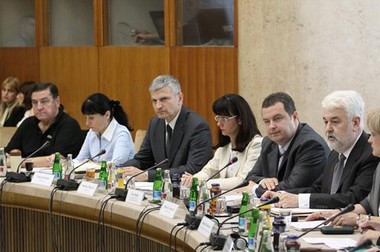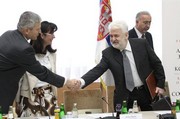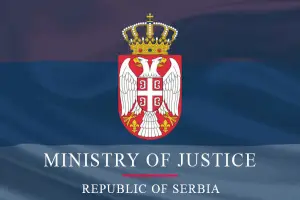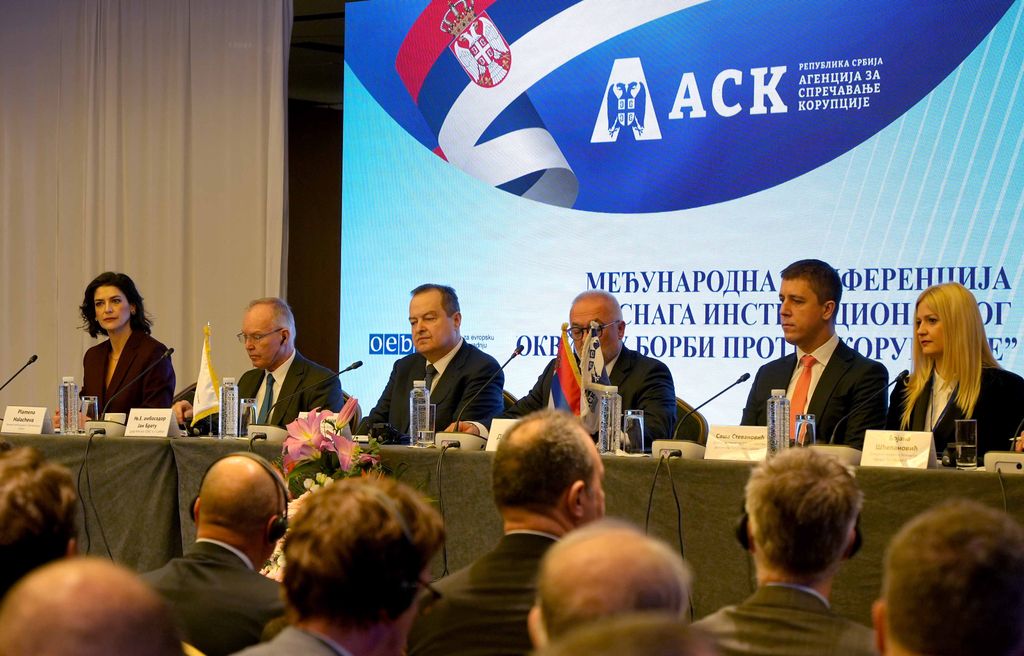Q:
A:
Government fully dedicated to fight against corruption
Belgrade,
18 June 2010
Prime Minister Mirko Cvetkovic emphasised today that the continuation, expansion and intensification of the fight against all forms of crime and corruption is one of the Serbian government’s top priorities.
Opening the “Prevention of Corruption through Integrity Plans” roundtable discussion, at which representatives of the government and the Anti-Corruption Agency took part, Cvetkovic stated that the implementation of anti-corruption measures is one of the most important conditions Serbia has to meet in its EU integration process.
The government and state organs will support the Anti-Corruption Agency in the fight against corruption and will adopt integrity plans in line with the suggestions and deadlines established by the Agency, he announced.
Integrity plans are the most important preventive measures in the fight against corruption and ministries must adopt them in order to increase transparency and accountability, the Prime Minister highlighted.
The government will cooperate with the Agency according to democratic principles and recommendations of the UN, Council of Europe and the EU. Clear criteria will be adopted concerning accountability, access to information and transparency, he declared.
Good cooperation between state organs and institutions and cooperation between countries in the region affirm the success of the fight against corruption, underlined Cvetkovic, adding that the government will intensify its activities regarding the implementation of anti-corruption laws.
A number of laws were adopted recently and judicial reforms were carried out in order to increase the effectiveness of the fight against crime and corruption. The government will improve the performance of state organs and support the fight against corruption, which will strengthen institutions, he observed.
First Deputy Prime Minister and Minister of the Interior Ivica Dacic said at the discussion that it is necessary to provide continuous support at the highest political level to all bodies responsible for the implementation of anti-corruption measures and to establish accountability for their proper implementation.
It is clear that the fight against corruption is one of the government’s top priorities, considering the fact that the rule of law is a basic requirement for security, he remarked.
Key regulations have been adopted concerning this area, and their implementation shows the level of the country’s determination to end corruption, Dacic noted.
Special units such as the police financial supervisory unit and independent institutions and anti-corruption bodies have been formed, he stressed.
It is necessary to continue training and equipping police units, he underscored, adding that the use of special investigation methods and techniques in the fight against organised crime and corruption is also very important.
Institutions must strategically be strengthened against systemic corruption. The goal of today’s meeting is to inform ministers about the obligations stemming from the National Anti-Corruption Strategy, the action plan for implementing the Strategy and the Law on the Anti-Corruption Agency, he outlined.
The aim is to establish joint obligations and steps related to the adoption of integrity and departmental plans, Dacic pointed out.
He emphasised the importance of establishing good cooperation between the police and the prosecutor’s office in the fight against crime and corruption, which is also important for Serbia’s EU integration process.
After the discussion, the Prime Minister and Director of the Anti-Corruption Agency Zorana Markovic signed a memorandum on cooperation for meeting obligations stemming from the National Anti-Corruption Strategy and the action plan for its implementation.
According to the memorandum, the Agency will provide expert help to the government and state administrative organs in meeting obligations pertaining to the Strategy and the action plan, particularly regarding the training of those responsible for drafting and implementing integrity plans.
The Agency is obliged to publish guidelines for the designing and implementation of integrity plans by 30 October 2010, and government and state organs must draft plans within established deadlines in line with these guidelines.
Government and state organs are obliged to appoint a person by 30 June 2010, who will be responsible for cooperation with the Agency regarding reports on fulfilment of obligations and tasks related to the Strategy and action plan.
They also pledged to submit quarterly reports to the Agency. Cvetkovic told the press that the economic positions set out by the group of businessmen and economists are more or less acceptable. To the extent it finds these positions useful, the government will include them in its concept and strategy. At first glance there does not seem to be much difference because both economists and businessmen propose building infrastructure and changing the concept of the economy as basic measures, the Prime Minister expounded.
He explained that the economists and businessmen submitted a document five to six pages long in which they presented global positions. He added that the concept which the government will propose will be much more serious and based on more analysis.
The government and state organs will support the Anti-Corruption Agency in the fight against corruption and will adopt integrity plans in line with the suggestions and deadlines established by the Agency, he announced.
Integrity plans are the most important preventive measures in the fight against corruption and ministries must adopt them in order to increase transparency and accountability, the Prime Minister highlighted.
The government will cooperate with the Agency according to democratic principles and recommendations of the UN, Council of Europe and the EU. Clear criteria will be adopted concerning accountability, access to information and transparency, he declared.
Good cooperation between state organs and institutions and cooperation between countries in the region affirm the success of the fight against corruption, underlined Cvetkovic, adding that the government will intensify its activities regarding the implementation of anti-corruption laws.
A number of laws were adopted recently and judicial reforms were carried out in order to increase the effectiveness of the fight against crime and corruption. The government will improve the performance of state organs and support the fight against corruption, which will strengthen institutions, he observed.
First Deputy Prime Minister and Minister of the Interior Ivica Dacic said at the discussion that it is necessary to provide continuous support at the highest political level to all bodies responsible for the implementation of anti-corruption measures and to establish accountability for their proper implementation.
It is clear that the fight against corruption is one of the government’s top priorities, considering the fact that the rule of law is a basic requirement for security, he remarked.
Key regulations have been adopted concerning this area, and their implementation shows the level of the country’s determination to end corruption, Dacic noted.
Special units such as the police financial supervisory unit and independent institutions and anti-corruption bodies have been formed, he stressed.
It is necessary to continue training and equipping police units, he underscored, adding that the use of special investigation methods and techniques in the fight against organised crime and corruption is also very important.
Institutions must strategically be strengthened against systemic corruption. The goal of today’s meeting is to inform ministers about the obligations stemming from the National Anti-Corruption Strategy, the action plan for implementing the Strategy and the Law on the Anti-Corruption Agency, he outlined.
The aim is to establish joint obligations and steps related to the adoption of integrity and departmental plans, Dacic pointed out.
He emphasised the importance of establishing good cooperation between the police and the prosecutor’s office in the fight against crime and corruption, which is also important for Serbia’s EU integration process.
After the discussion, the Prime Minister and Director of the Anti-Corruption Agency Zorana Markovic signed a memorandum on cooperation for meeting obligations stemming from the National Anti-Corruption Strategy and the action plan for its implementation.
According to the memorandum, the Agency will provide expert help to the government and state administrative organs in meeting obligations pertaining to the Strategy and the action plan, particularly regarding the training of those responsible for drafting and implementing integrity plans.
The Agency is obliged to publish guidelines for the designing and implementation of integrity plans by 30 October 2010, and government and state organs must draft plans within established deadlines in line with these guidelines.
Government and state organs are obliged to appoint a person by 30 June 2010, who will be responsible for cooperation with the Agency regarding reports on fulfilment of obligations and tasks related to the Strategy and action plan.
They also pledged to submit quarterly reports to the Agency. Cvetkovic told the press that the economic positions set out by the group of businessmen and economists are more or less acceptable. To the extent it finds these positions useful, the government will include them in its concept and strategy. At first glance there does not seem to be much difference because both economists and businessmen propose building infrastructure and changing the concept of the economy as basic measures, the Prime Minister expounded.
He explained that the economists and businessmen submitted a document five to six pages long in which they presented global positions. He added that the concept which the government will propose will be much more serious and based on more analysis.











